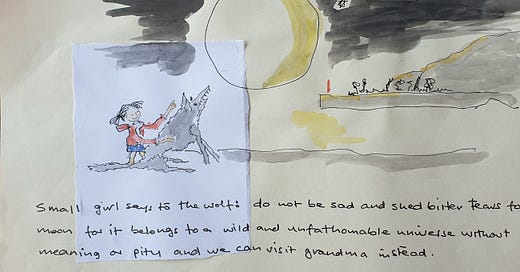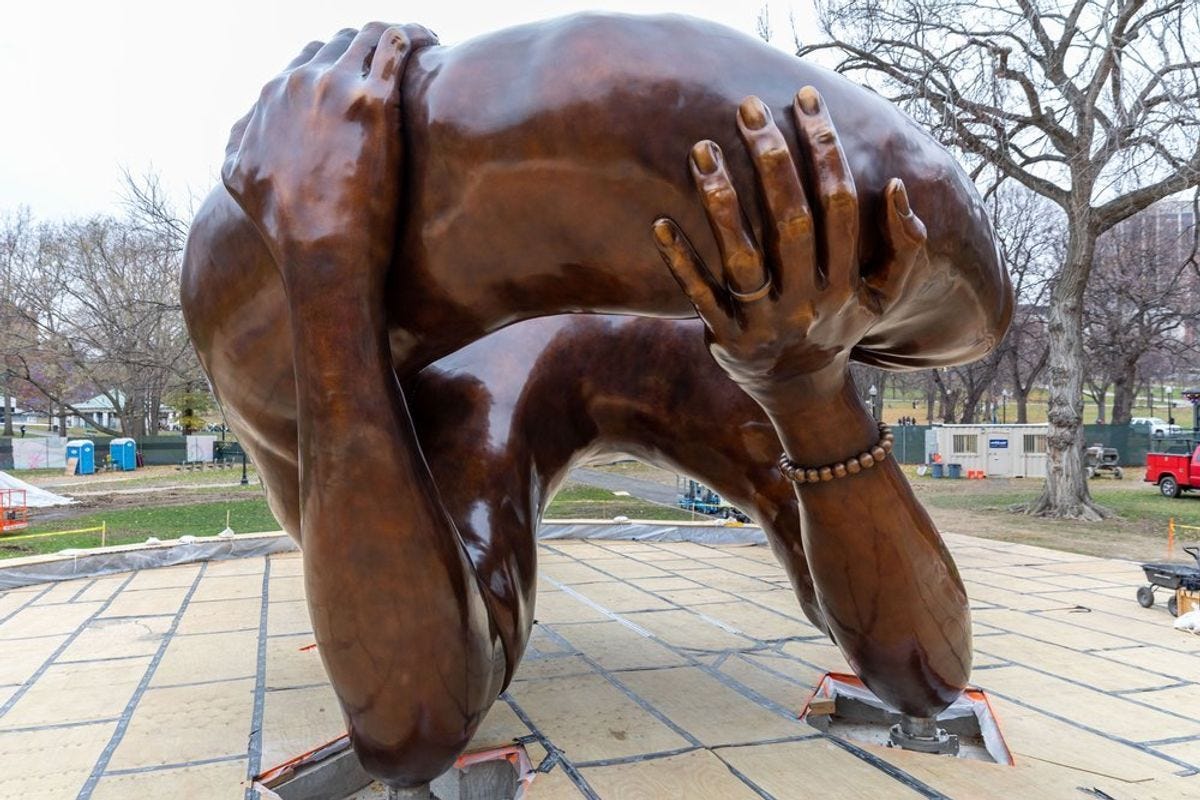I have a friend Alex who sends me ditties like this


Can gratitude save humanity? (Hint: No)
I listened to this lecture by Matthew Crawford — which you can find on this link even though he’s paywalled it to his Substack audience. (You can listen or read).
I thought the early few paragraphs were very good and there are some good bits in it.
But I was also saddenned by his obvious comfort among the anti-woke right. I’m pretty anti-woke but I’m afraid they give me as little comfort as ever :)
He thinks Mary Harrington is a wit, whereas, while I might often agree with the points she’s making, that’s usually because she’s making them against such soft targets. She doesn’t illuminate much beyond her performance of the side she takes.
Crawford’s jokes are also rather unfunny.
Then again I liked his definition of ‘conservatism’ as a temperament of gratitude for the actual. Anyway, here’s how the lecture begins:
We feel gratitude when someone does something for us outside the realm of exchange. One wants to mark it, this arrival of something that overflows what is expected, and recognise the source of it. In acting outside necessity, our benefactor shines.
Or one may feel gratitude without a counterparty to receive it, in response to some fortunate condition that could have been otherwise. Having good health or good looks, for example. Life itself. Something for which we are not responsible, a gift.
Whether in response to good fortune or to some identifiable benefactor, in taking note of this gift one feels that one has regained a proper coordinate system. It is a calm feeling. One shucks off that irritable, constant background sense of not receiving one’s due — the sense of a self inflated beyond its true proportions. For it does feel like a little dose of truth, this moment of reorientation. Seeing oneself from the outside as one who receives rather than demands is also liberating — from resentment, entitlement, grievance. You feel lighter, as well as smaller. And more ready to act with grace toward others; that is, to be larger. For grace and gratitude have the same root, whether one is speaking etymologically or psychologically.



What if peasants do not want to move to cities?
Branco on how economic modernisation can be slow — if you don’t move fast and break things as was done in Western European pioneers of the industrial revolution.
In a paper that I wrote several years ago with Boško Mijatoviċ on the real wage in the 19th century Serbia (the published version here; the accessible draft version here), we deal with an interesting and not novel problem. In a society where 90 percent of the population lives in the countryside and all farmers cultivate their own (small) landholding, and there is no landlessness, how do you industrialize?
All contemporary evidence points to the fact that peasants were not at all keen to move to cities and work for a wage. Since there was no landlessness very few people were pushed by poverty to look for city jobs. Political parties which strongly (and understandably) represented peasantry further limited mobility of labor by guaranteeing homestead (3.5 ha of land, house, cattle, and the implements) which could not be alienated, neither in the case of default on a loan nor in the case of overdue taxes.
This situation was very typical for the late industrializers in South-East Europe. Greece, Bulgaria and Serbia were all overwhelmingly agricultural with small peasant landholdings and no landlessness. All displayed slow or arrested capitalist development and half-hearted urbanization. The reason was simple: farmers had no incentive to move from being self-employed to being hired labor. And who would prefer to switch from being one’s own boss and dependent perhaps only on the elements to become a hired hand, working six days a week all year round, in “satanic mills”?


Casablanca: “my first time watching”
About two weeks ago, I was unaware of the “My first time watching” genre. But the YouTube algorithm had other ideas. I love Casablanca — it’s not just my favourite movie, but I’d be prepared to argue it’s the best movie I’ve seen. Anyway, the first of the videos (above) shows you a real film buff watching the film for the first time. He’s blown away and it’s fun, especially if you like the movie, to watch his reactions. And you learn things.
I went from there to “how to write a scene” (below) which took me through a scene I'd only dimly remembered and showed me the craft involved in the script. It’s a magnificent illustration of a crucial scene in which not a word, nor a feeling is extraneous.
Then I got another “my first time” by someone who added little and I clicked through to watch a few minutes and forgot about it. The final video below is quite the artefact. It’s the bimbo’s take on Casablanca. Rick is “so sweet”. The characters are so “weird”. Say no more. These people are not interested in plumbing some artefact from another generation for signs of the different ways people thought. They’re not interested in thinking of how people’s values might be different in the middle of a world war, and how that might clarify their thinking.
In their overweening, stratospheric complacency, they can only reduce the movie to things they already know about. The black and white film in the background with the two bimbo bubbles is quite the cultural artefact in itself — a postmodern cultural artefact. A serious work refracted in real-time through the eyes of a generation eighty years after its creation. And yet at the end you can see that some communication does get through the bimbos’ reductionism, just like some soldiers made it through the machine guns at Omaha Beach!
A Masturbatory ‘Homage’ to My Family
From the department of ‘Oops’
An anti-woke cry from the heart from Corretta Scott King’s first cousin once removed:
By now, I’m sure you’ve seen it. The new Boston sculpture “honoring” Dr. Martin Luther King and his wife, Coretta Scott King, looks more like a pair of hands hugging a beefy penis than a special moment shared by the iconic couple.
Ten million dollars were wasted to create a masturbatory metal homage to my legendary family members—one of the all-time greatest American families. Still, the Boston debacle could be a blessing in disguise, by exposing the insidiousness of astroturfed woke movements that have come to dominate black America: How could anyone fail to see that this was a major dick move (pun intended) that brings very few, if any, tangible benefits to struggling black families?
“Consider this our Declaration of Interdependence,” declares the Embrace Boston website. What does that even mean? Black families in America who need help don’t care for more woke slogans. They need jobs that pay the bills and keep up with food and energy costs that are rising faster than ever before for most of us. Building expensive, stupid new statues with no faces on them—and tearing down others for no good reason—are part of the same performative altruism and purity pageants that are mainstays of the woke left.
So now Boston has a big bronze penis statue that’s supposed to represent black love at its purest and most devotional.









